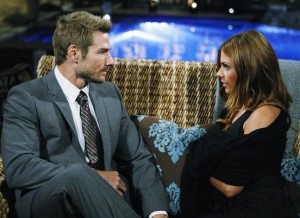 Last night on the Valentine’s Day episode of “The Bachelor” we all cheered when Michelle was finally let go by Brad (watch the show). I’m sure we all saw the signs of someone that made us nervous, afraid, and incredibly conscious of the “Fatal Attraction”-esque characteristics that Michelle apparently portrayed. It was both frustrating and gut-wrenching that we couldn’t just call Brad and run some intervention – stay away, listen to your gut. And last night, Brad finally did just that. I’m sure we all collectively sighed and whispered – well, it’s about time he came to his senses.
Last night on the Valentine’s Day episode of “The Bachelor” we all cheered when Michelle was finally let go by Brad (watch the show). I’m sure we all saw the signs of someone that made us nervous, afraid, and incredibly conscious of the “Fatal Attraction”-esque characteristics that Michelle apparently portrayed. It was both frustrating and gut-wrenching that we couldn’t just call Brad and run some intervention – stay away, listen to your gut. And last night, Brad finally did just that. I’m sure we all collectively sighed and whispered – well, it’s about time he came to his senses.
Or, perhaps, more likely, it was about time he listened to his senses that had been telling him something is wrong all along.
As an online safety expert, I thought about all the challenges many singles, bachelor or bachelorette, face today when trying out online dating. Despite the fact that we can’t see the person when we meet online – their facial twitches, their eye movements, their smile, their quirks – we continue to have this innate sense of alert that triggers when something just isn’t right. Brad certainly was able to see all the signs we so diligently observed on the show.
So what do many people do instead? They still set up a meeting in person, in private, where no one can help them if they call for help. Check out a recent example here.
And what should we do?
The best defense against a tragic encounter is you. Every time you plan to meet someone you’ve only met online, think of it as your first meeting ever – keep it public, keep it visible, and make it known to your friends.
Here are some tips to keep in mind –
-If something seems “off” in the online interaction, there’s no reason to meet them in real life, you’re probably right so trust yourself.
-Interact with the person online before you meet them in the physical world to give your instincts a chance to tell you whether to meet or not.
-Don’t give out too much information about yourself before you meet the person face to face, they may not need to know your last name, neighborhood you live in, your gym, or where you work or go to school.
-Good places to meet are well lit areas in good/safe parts of town that are popular- a cafe or restaurant for example.
-You are under no obligation to stay a minimum amount of time with someone who sets off alarm bells- just leave.
Learn more here.


Follow me